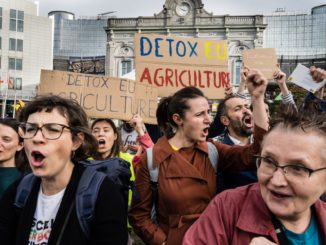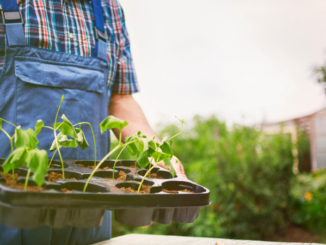
With the European elections just around the corner, civil society is revving up for the next mandate. Ahead of the vote, ARC2020 has compiled a one-stop shop of resources from farming, environmental, and food civil society organisations. Interestingly, there is a lot of overlap between these sectors in what is a fascinating set of tools for action. Let’s have a look at some of them.
Between 6-9 June 2024, some 400 million citizens from across the EU will have the chance to elect their representatives in the European Parliament.
Polls indicate that the next European Parliament will likely take a decisive swing to the right, which is adding fuel to the fire of the growing and fierce opposition to green policies. But polls also suggest that food and farming are rising on the list of EU citizens’ priorities, as well as a growing awareness of how unsustainable food systems sit at the crossroads of our biggest social, environmental and economic crises.
So, how best to make sure your vote reflects this, and align your vote with your values? And what direction should policies be driven in the future to tackle this? To help steer you through this election period, ARC2020 has compiled some resources from campaign groups at the coalface of driving the EU’s sustainable food systems transition.
Mobilising Voters with Good Food Good Farming
Just ahead of this year’s European Parliament Elections, the Good Food Good Farming (GFGF) movement has launched its #VoteFutureEU campaign. The campaign aims to mobilise people across Europe and “make sure EU politicians are watching”.
“Millions of Europeans are not aware how influential EU politicians are when it comes to our food and farming. We can change that,” the movement stresses.
GFGF is organising a joint demonstration with climate, environment and farming organisations from across the EU, which you can join on Saturday 1 June from 1:00 to 3:00 PM at Place de l’Albertine in Brussels.
Check out their website for all the information you need on how to get involved.
Future Pacts and Current Scorecards
The European Environmental Bureau has focused its energies into launching a campaign calling for a European pact for the future.
With a new political mandate in the EU on the horizon, the green campaign group is calling for an ambitious agenda as a “beacon of hope that unlocks the potential for all citizens, communities, and sustainable businesses to lead a just transition towards a future where people thrive within the boundaries of our one healthy planet”.
The group urges people not to “succumb to despair or resignation” faced with the intertwined climate, biodiversity and pollution crises, but instead to channel energy into a transition which “builds trust, spurs innovation, and ensures future prosperity in harmony with the planet”.
This builds upon its own scorecard, which launched in April. This was developed by what was called the Vote for Nature Alliance, including BirdLife Europe, Climate Action Network (CAN) Europe, European Environmental Bureau, Transport & Environment, and WWF European Policy Office.
The scorecard gives citizens a reading of the performance, in each member state, of its MEPs. The scoring assesses voting behaviour across 30 policy files in climate, energy and environmental legislation. 12 policy files focused on a climate-neutral and socially just transition, 8 focused on a nature-positive Europe, and 10 focused on the circular economy and achieving zero pollution.
Using protectors, procrastinators and prehistoric thinkers as categories, MEP performance on climate nature and pollution is assessed.
How did your MEPs perform? Read/download the EU-Parliament-Scoreboard_2024
“We must choose hope. We need a European Pact for the Future, a new social and environmental deal for a one-planet economy that ensures a just transition for all. This is how we leave a legacy of a better world for generations to come,” the EEB stressed.
Learn more about the EEB’s vision on the ingredients for a successful pact here, and sign the pact here. See an example of its scorecard for German MEPs below.
Farmers and Citizens Interests Aligned
Ahead of the elections, small farmers association ECVC has launched a new manifesto in which it lays out its vision for the future.
Read/Download the EN-ECVC-recommendations-for-the-European-elections-in-June-2024
On the back of what the group calls an “agricultural uprising across Europe” – in reference to the spate of farmers protests seen this year – the group reiterates to future policy makers that there are “clear demands for fairer prices and agricultural markets and better working conditions.”
“The European elections in June 2024 must allow our decision-makers to organise a transition of agricultural and food systems based on this vision of food sovereignty,” the association writes.
Meanwhile, the farmers’ group stresses that proposals on simplifying bureaucracy “cannot be implemented without addressing the huge climate and environmental challenges of our time” (See here for background).
Emphasising that the interests of farmers and citizens must be prioritised, the small farmers association calls for bridge-building for “solidarity and understanding between urban and rural areas and deconstruct the current polarising rhetoric” in their vision for the future course.
Relatedly, over on Instagram, German members of ECVC ABL is in campaign mode. It says; “Across Europe, we need many and diverse farms and farmers with their knowledge and skills: for a crisis-proof regional food supply, for vibrant rural areas, for environmental, climate and animal protection. But farms are continuing to disappear. In Germany alone, we are losing over 3,000 farms every year.
This shows that there is an urgent need for reliable and economic prospects for farms. But instead of helping farms to prepare for the future, the EU Commission and Parliament are currently working on massive setbacks in environmental and climate protection. Right-wing conservative MEPs in particular have clearly voted against the interests of diverse farming in recent months.”
This not only harms nature, but ultimately also all farmers. We need political majorities in the EU that tackle the challenges of our time together! But: According to official forecasts, right-wing extremists and populists could gain significant seats in the upcoming elections. Their backward-looking policies are detrimental to farmers’ concerns and pose an acute threat to a free, secure Europe.
Our demands to the EU:
- Make the CAP fairer, greener & simpler
- Ensure fair producer prices through better market regulation
- Support farmers in the restructuring of animal husbandry
- Implement seed rights & stop genetic engineering and patents
- Protect soils effectively & secure access to land
Score Cards for Food Systems
To inform voters ahead of the vote, members of the EU Food Policy Coalition, made up of a range of civil society organisations, have developed scorecards on political groups’ track records on key votes related to food and agricultural policy during this past Parliamentary term.
Thanks to the help of open-source data available at MEP Watch, the organisation analysed the voting records for a list of what they identified as key votes. These span five categories – : (1) need for a transition; (2) Access to healthy and sustainable diets; (3) Social justice for farmers and citizens; (4) Nature-friendly farming and shifting towards agroecology, and (5) Transitioning towards ethical animal production.
The analysis found that the Greens/EFA group were head and shoulders above the rest when it came to the sustainable transition, with over 95% of the group found to have voted in line with policies enabling this. This was closely followed by the Socialists and Democrats (S&D) group with 85% voting in accordance with the need for a transition.
In comparison, only 20% of the members of the European People’s Party (EPP) and under 4% of the European Conservatives and Reformists (ECR) were found to have backed sustainable policies.
Meanwhile, policies focused on improving access to healthy and sustainable diets across Europe were overwhelmingly supported by more than three quarters of all political groups in the Parliament, except ECR, Identity and Democracy (ID) and non-attached MEPs (NI).
The FPC analysis also highlighted a division among Renew MEPs, who were consistently split on sustainability. Meanwhile, roughly 2 in 3 of centre-right MEPs favoured weakening binding rules for pesticide use in sensitive areas and for the implementation of integrated pest management.
Lastly, ethical animal production was clearly low on the list of EPP, ECR, and ID priorities. Respectively, slightly less than 7%, 12% and 8% of their MEPs voted in favour of measures that the FPC considers would have supported the promotion of stock recovery for European fisheries and the establishment of a plant-based protein plan.
In stark contrast, the Greens/EFA group emerged as a clear champion in the transition towards more ethical animal production, with more than 90% backing policies that the coalition considers would help move towards sustainable animal funding.
Check out the scorecards here to help align your vote with your values.
More
Survey Shows Huge Support for Nature Restoration Law in Blocking Member States
Eleven Member States make last bid to save EU’s nature restoration law – but will it bear fruit?
What the EU farmers survey tells us – and doesn’t tell us – about CAP burden
Spring to Summer 2024 Editorial – Build Better Policy from the Ground up
Green Light Now, Green Fight Later – CAP Fast Track Risks Legal Wrangle
EPP’s Von der Leyen Launches Second Term Bid without Mentioning Farmers – Once.
European Farmers are Angry: Addressing Root Causes Would Overcome Polarisation












